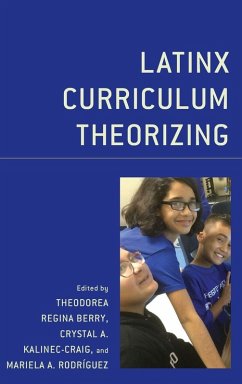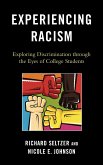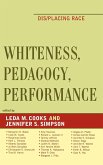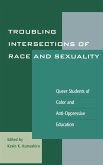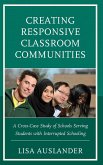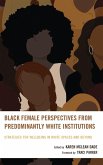Latinx Curriculum Theorizing
Herausgeber: Berry, Theodorea Regina; Kalinec Craig, Crystal A; Rodríguez, Mariela
Latinx Curriculum Theorizing
Herausgeber: Berry, Theodorea Regina; Kalinec Craig, Crystal A; Rodríguez, Mariela
- Gebundenes Buch
- Merkliste
- Auf die Merkliste
- Bewerten Bewerten
- Teilen
- Produkt teilen
- Produkterinnerung
- Produkterinnerung
This book is a collection of empirical scholarship on curriculum connected to the Latinx diaspora from three perspectives: curriculum as content/subject matter; curriculum for schools’ goals, objectives, and purposes; and curriculum as autobiography.
Andere Kunden interessierten sich auch für
![Developing Culturally Responsive Learning Environments in Postsecondary Education Developing Culturally Responsive Learning Environments in Postsecondary Education]() R. Jason LynchDeveloping Culturally Responsive Learning Environments in Postsecondary Education112,99 €
R. Jason LynchDeveloping Culturally Responsive Learning Environments in Postsecondary Education112,99 €![Experiencing Racism Experiencing Racism]() Experiencing Racism136,99 €
Experiencing Racism136,99 €![Whiteness, Pedagogy, Performance Whiteness, Pedagogy, Performance]() Whiteness, Pedagogy, Performance136,99 €
Whiteness, Pedagogy, Performance136,99 €![Troubling Intersections of Race and Sexuality Troubling Intersections of Race and Sexuality]() Troubling Intersections of Race and Sexuality134,99 €
Troubling Intersections of Race and Sexuality134,99 €![Creating Responsive Classroom Communities Creating Responsive Classroom Communities]() Lisa AuslanderCreating Responsive Classroom Communities103,99 €
Lisa AuslanderCreating Responsive Classroom Communities103,99 €![Racial Subjection Theory in Higher Education Racial Subjection Theory in Higher Education]() Jon S IftikarRacial Subjection Theory in Higher Education89,99 €
Jon S IftikarRacial Subjection Theory in Higher Education89,99 €![Black Female Perspectives from Predominantly White Institutions Black Female Perspectives from Predominantly White Institutions]() Black Female Perspectives from Predominantly White Institutions89,99 €
Black Female Perspectives from Predominantly White Institutions89,99 €-
-
-
This book is a collection of empirical scholarship on curriculum connected to the Latinx diaspora from three perspectives: curriculum as content/subject matter; curriculum for schools’ goals, objectives, and purposes; and curriculum as autobiography.
Produktdetails
- Produktdetails
- Verlag: Bloomsbury Publishing PLC
- Seitenzahl: 186
- Erscheinungstermin: 5. Februar 2019
- Englisch
- Abmessung: 235mm x 157mm x 15mm
- Gewicht: 429g
- ISBN-13: 9781498573801
- ISBN-10: 1498573800
- Artikelnr.: 54375138
- Herstellerkennzeichnung
- Libri GmbH
- Europaallee 1
- 36244 Bad Hersfeld
- gpsr@libri.de
- Verlag: Bloomsbury Publishing PLC
- Seitenzahl: 186
- Erscheinungstermin: 5. Februar 2019
- Englisch
- Abmessung: 235mm x 157mm x 15mm
- Gewicht: 429g
- ISBN-13: 9781498573801
- ISBN-10: 1498573800
- Artikelnr.: 54375138
- Herstellerkennzeichnung
- Libri GmbH
- Europaallee 1
- 36244 Bad Hersfeld
- gpsr@libri.de
Theodorea Regina Berry is professor and chair of the Department of African American studies at San Jose State University. Crystal Kalinec Craig is assistant professor of mathematics education in the Department of Interdisciplinary Learning and Teaching at the University of Texas at San Antonio. Maríela A. Rodriguez professor in the Department of Educational Leadership and Policy Studies and associate dean of teaching, learning, and professional development for the graduate school at the University of Texas at San Antonio.
Prologue
Acknowledgments
Introduction
Section One: Latinx Curriculum and Content/Subject Matter
Chapter 1: Insurrection and the Decolonial Imaginary at Academia Cuauhtli:
The Liberating Potential of Third Space Pedagogies in a Third Space, Angela
Valenzuela
Chapter 2: "To Serve the People": Transformational Praxis of the Chicago
Young Lords, Ann Aviles, Richard Benson, and Erica Davila
Chapter 3: Mathematics for Borderland Identities, Cristina Valencia
Mazzanti and Martha Allexsaht-Snider
Section Two: Latinx Curriculum in Schools: Addressing Goals, Objectives,
and Purposes
Chapter 4: Southern Latinxs: Toward a Curricular Epistemology of Dissent
and Possibility, Juan F. Carrillo and Lucia I. Mock Muñoz de Luna
Chapter 5: "Illegality" and the Curriculum: Making New Civics with
Undocumented Activists, Jesús A. Tirado
Chapter 6: Radical Literacy: Building Curriculum on Mexican American
Youth's Lived Experiences, Stacy Saathoff
Section Three: Latinx Currere, Latinx Curriculum as Autobiographical
Chapter 7: Conocimientos Míos: Engaging Possibilities for School
Curriculum, Alba Isabel Lamar and Lynette DeAun Guzmán
Chapter 8: "Un Puño de Tierra": Curriculum and Pedagogy Theorizing Along
the U.S./Mexico Border, Ganiva Reyes
Chapter 9: Currere from the Borderlands: An Exercise in Possibilities for
Latinx Transgender Visibility, Mario Itzel Suárez
Epilogue
About the Authors
Acknowledgments
Introduction
Section One: Latinx Curriculum and Content/Subject Matter
Chapter 1: Insurrection and the Decolonial Imaginary at Academia Cuauhtli:
The Liberating Potential of Third Space Pedagogies in a Third Space, Angela
Valenzuela
Chapter 2: "To Serve the People": Transformational Praxis of the Chicago
Young Lords, Ann Aviles, Richard Benson, and Erica Davila
Chapter 3: Mathematics for Borderland Identities, Cristina Valencia
Mazzanti and Martha Allexsaht-Snider
Section Two: Latinx Curriculum in Schools: Addressing Goals, Objectives,
and Purposes
Chapter 4: Southern Latinxs: Toward a Curricular Epistemology of Dissent
and Possibility, Juan F. Carrillo and Lucia I. Mock Muñoz de Luna
Chapter 5: "Illegality" and the Curriculum: Making New Civics with
Undocumented Activists, Jesús A. Tirado
Chapter 6: Radical Literacy: Building Curriculum on Mexican American
Youth's Lived Experiences, Stacy Saathoff
Section Three: Latinx Currere, Latinx Curriculum as Autobiographical
Chapter 7: Conocimientos Míos: Engaging Possibilities for School
Curriculum, Alba Isabel Lamar and Lynette DeAun Guzmán
Chapter 8: "Un Puño de Tierra": Curriculum and Pedagogy Theorizing Along
the U.S./Mexico Border, Ganiva Reyes
Chapter 9: Currere from the Borderlands: An Exercise in Possibilities for
Latinx Transgender Visibility, Mario Itzel Suárez
Epilogue
About the Authors
Prologue
Acknowledgments
Introduction
Section One: Latinx Curriculum and Content/Subject Matter
Chapter 1: Insurrection and the Decolonial Imaginary at Academia Cuauhtli:
The Liberating Potential of Third Space Pedagogies in a Third Space, Angela
Valenzuela
Chapter 2: "To Serve the People": Transformational Praxis of the Chicago
Young Lords, Ann Aviles, Richard Benson, and Erica Davila
Chapter 3: Mathematics for Borderland Identities, Cristina Valencia
Mazzanti and Martha Allexsaht-Snider
Section Two: Latinx Curriculum in Schools: Addressing Goals, Objectives,
and Purposes
Chapter 4: Southern Latinxs: Toward a Curricular Epistemology of Dissent
and Possibility, Juan F. Carrillo and Lucia I. Mock Muñoz de Luna
Chapter 5: "Illegality" and the Curriculum: Making New Civics with
Undocumented Activists, Jesús A. Tirado
Chapter 6: Radical Literacy: Building Curriculum on Mexican American
Youth's Lived Experiences, Stacy Saathoff
Section Three: Latinx Currere, Latinx Curriculum as Autobiographical
Chapter 7: Conocimientos Míos: Engaging Possibilities for School
Curriculum, Alba Isabel Lamar and Lynette DeAun Guzmán
Chapter 8: "Un Puño de Tierra": Curriculum and Pedagogy Theorizing Along
the U.S./Mexico Border, Ganiva Reyes
Chapter 9: Currere from the Borderlands: An Exercise in Possibilities for
Latinx Transgender Visibility, Mario Itzel Suárez
Epilogue
About the Authors
Acknowledgments
Introduction
Section One: Latinx Curriculum and Content/Subject Matter
Chapter 1: Insurrection and the Decolonial Imaginary at Academia Cuauhtli:
The Liberating Potential of Third Space Pedagogies in a Third Space, Angela
Valenzuela
Chapter 2: "To Serve the People": Transformational Praxis of the Chicago
Young Lords, Ann Aviles, Richard Benson, and Erica Davila
Chapter 3: Mathematics for Borderland Identities, Cristina Valencia
Mazzanti and Martha Allexsaht-Snider
Section Two: Latinx Curriculum in Schools: Addressing Goals, Objectives,
and Purposes
Chapter 4: Southern Latinxs: Toward a Curricular Epistemology of Dissent
and Possibility, Juan F. Carrillo and Lucia I. Mock Muñoz de Luna
Chapter 5: "Illegality" and the Curriculum: Making New Civics with
Undocumented Activists, Jesús A. Tirado
Chapter 6: Radical Literacy: Building Curriculum on Mexican American
Youth's Lived Experiences, Stacy Saathoff
Section Three: Latinx Currere, Latinx Curriculum as Autobiographical
Chapter 7: Conocimientos Míos: Engaging Possibilities for School
Curriculum, Alba Isabel Lamar and Lynette DeAun Guzmán
Chapter 8: "Un Puño de Tierra": Curriculum and Pedagogy Theorizing Along
the U.S./Mexico Border, Ganiva Reyes
Chapter 9: Currere from the Borderlands: An Exercise in Possibilities for
Latinx Transgender Visibility, Mario Itzel Suárez
Epilogue
About the Authors

